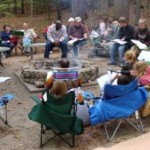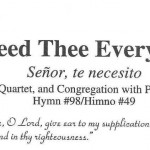Three Church Meetings in One Day
We met with the church three times yesterday. Yeah, I know that some churches have three or more “services” in the same day, but that’s not exactly what I’m talking about.
First, we met the church at our normal meeting place and our normal meeting time. This week, we sang some songs a capella that the brothers and sisters wanted to sing. Between songs, we prayed for various requests. Then, Geth led us in a study of Genesis 32. After we discussed that passage and encouraged each other to trust God (even as we “wrestle” with God), several people made announcements about upcoming events they are planning, like a camping trip for the church, or a trip to Carowinds for the teenagers, or a get-together in the park that afternoon. We then ate together and continued fellowshiping for a while.
Second, during our time of prayer request, I updated my brothers and sisters about my friend T. (See my post “The doctor told her she’s dying.”) I told them that after we finished eating, I was planning to go visit T., and I invited them to go with me. Several decided to go. So, we drove over to T.’s apartment. We talked for a few minutes, then I told her that we wanted to sing with her, read Scripture together, and pray with her. She asked if we would sing “How Great Thou Art,” so we did. Then, I read Ephesians 1, when includes a list of such great spiritual blessings from God. Then we sang “In Christ Alone,” and prayed together. It was a beautiful time. As we left, one of my dear friends stayed with T. for a while longer.
Third, a little later in the afternoon, I drove out to a local park where a family said they were going. It turns out that some other brothers and sisters came also. We played volleyball together, sat around for awhile, and walked around some trails. It was a great to spend time together, talking about what God was doing, and encouraging one another just as we had fun together.
The only bad thing about yesterday is that my wife, Margaret, was sick. She started running a slight fever Saturday night and it continued Sunday morning.
I’m looking forward to spending more time with the church this week (yes, this week, not just this weekend). I’m also looking forward to seeing T. this week. Perhaps I’ll be able to connect with some of T.’s neighbors that I haven’t had the chance to meet yet.
I came together with the church Sunday morning with a song and a pot of chili. God gave so much more through my brothers and sisters.
What did you bring to meet with your church yesterday (or whenever)? How did you meet with the church? How did God encourage your and how did he encourage others through you?
Participation and Worship
Since my post from earlier this morning was about worship, I thought that I would continue to topic by pointing out another (very good) post on the subject.
Mark (from “Called Out in Kansas“) recently attended a 2-day conference about worship. After returning, he wrote a few posts, including one called “After the Worship Conference.” He this post Mark also comments on my post “The Purpose of Participation” as well as Dan’s post “Stirring Up.”
In this last paragraph, especially, Mark adds alot of thought and insight to this discussion:
So, here’s the situation. I’ve been a vocal proponent of participatory style meetings, and very critical of traditional church models. I still believe that the New Testament model is participatory, and that a single pastorate system is unbiblical, and harmful to the maturity of the body. But, as pointed out by Alan and Dan in the above posts, just attending participatory meetings doesn’t guarantee that the end result will be any different than in the system we just left. My concern for this movement, if you want to call it that, is that we will recreate a system, and never achieve the maturity of the body described in Ephesians 4. Like Alan said, the goal is to become like Christ, or to literally become His body and bride, fully matured. Will meeting in a circle instead of in rows with a pulpit bring that about? Unfortunately, in and of itself, no. The question I now pose, after reading these posts, is what do we do IN these meetings that brings maturity? Certainly Hebrews 10:24-25 gives some insight, stating that we are to consider one another to stir up love and good works, which I interpret to mean we are to esteem others higher than ourselves, and care more for their needs than for our own. But I am not sure that this even gives the whole picture.
So, is it important to understand why we meet together? Why or why not? (I hope so… that’s what my PhD research and dissertation is all about.)
Stirring the Pot
Speaking of participation (we were, weren’t we?), I forgot to mention a great post by Dan (at “The Ekklesia in Southern Maine“) called “Stirring Up.” (Dan’s comment reminded me.)
In this post, Dan is asking about the purpose of gathering together. Is our purpose just to get together? Or is there something more. He writes:
So more importantly than the question of whether we gather or not we need to ask “are we considering one another, stirring up love and good works?†So, are we? Am I? That should be the question we ask ourselves. That should be our goal in gathering together. We can’t do this without gathering, but gathering doesn’t mean that this is happening either. maybe we should think about this when we go to church on Sunday, and assess our activities during that time through the lens of Scripture.
Hmmm… are we? Am I? Good questions.
(By the way, “stirring” can also be translated “provoking”… but not toward bad things, but toward love and good works, of course.)
The Purpose of Participation
For the last few yeas, our church gatherings have been more participatory – meaning, more people take part in the speaking, teaching, edifying, encouraging, etc. that happens during our church meetings.
However, participation is not an end in itself. Our goal is not increased participation from the body of Christ. Our goal when meeting together is mutual edification (1 Corinthians 14:26; Hebrews 10:24-25). We allow and encourage many people to take part in our meetings because we understand that God works through all of his children (mutual) in order to help us all walk in maturity in Christ (edification).
So, a participatory meeting is not our goal, but a tool that God uses to build up his children when the church meets.
Disregard 1 Corinthians 11-14?
Frank at “Reimagining Church” has published a letter from Jon Zens to Jim Belcher, author of Deep Church, in a post called “An Analysis of Jim Belcher’s Deep Church.”
Much of the analysis focuses on the manner that churches meet together. For example, Jon writes:
You assert, “Since the Bible does not give us enough information to construct a worship service, we must fill in the blanks†(p.137).  Why do we feel compelled to find a “worship serviceâ€?  There is no evidence that the early church had “worship services,†as we conceive of them.  The largest insight we have about a Christian gathering appears in 1 Cor.14.  We have these glimpses because Paul was correcting a problem.  In this passage we see (1) the whole ekklesia gathered; (2) an open meeting where everyone was potentially involved in prophecy; (3) that what was spoken had to be understood by all; (4) multiple expressions from many, “each of you has…â€; (5) no mention of a sermon by one person; (6) no pulpit; (7) no leaders.  You mention “the people up front†(p.139), but in the 1 Cor.14 meeting there is no “front,†as they met in homes with simplicity as a family.  Indeed, while the NT does not give a lot of information about believers’ gatherings, my question is: Why have our traditions essentially jettisoned what light we do have from 1 Cor.14 and other passages?
Later he writes:
Again I must ask, is it hermeneutically responsible to disregard the weight of 1 Cor.11-14 and fill in the blanks with practices that fly in the face of what is revealed?
There is much about meeting together that Scripture does NOT tell us. However, Scripture does tell us some things about how the early churches met together, and how Paul specifically instructed some early churches to meet together. Thus, we have a kind of path to follow.
Why would we want to stray from that path? Why would we want to disregard 1 Corinthians 11-14 and other passages that describe some aspects of church gatherings?
I’ve read many books and articles in which the authors defend modern church practices. But, I’ve never seen this question answered.
I Need Thee Every Hour
When we get together with the church, we often sing songs together. This is not unusual, of course, because many believers sing songs when they gather with the church.
Sometimes we sing old songs and hymns, and sometimes we sing newer songs. This is not unusual either, because many churches sing a mix of older and new songs.
But, when we sing songs together, we will often stop and talk about the songs. This is the only church that I’ve ever met with that actually talked about the songs that they sang.
Last Sunday, when we were meeting together, we sang a hymn called “I Need Thee Every Hour.” After we finished singing, I asked my brothers and sisters about the song. Specifically, I asked if anyone would be willing to share how God was teaching them to rely on him every moment of every day.
Several people spoke up. One brother said that he had been struggling with obeying God. There were several things that he knew that he should be doing in order to obey God, but he always claimed to be too tired or to not have enough time. Lately, he said, he was learning to accept the conviction of the Holy Spirit and rely on God to give him the strength and time to do whatever God called him to do.
A sister shared about something that happened in her family. In fact, it happened to her 13 year old son. She gave him permission to share, because he had shared it with his family. During the past week, while doing some errands with his father, this young man was struggling with his attitude. He said he recognized his sin and began praying. His countenance changed and he began working with joy. His father testified that he noticed the difference, and the reason the family knew that the boy had prayed for help is that the father asked his son what had caused the difference.
A few other people shared as well. And, each one that shared encouraged us to rely on God every moment of every day. They either encouraged us directly or through their stories.
I love it when we talk about the songs that we sing. I love it when God uses those times to encourage, challenge, and even admonish his children.
Do you remember a song that you sang with the church recently? What does that song stick in your memory? What is God teaching you through that?
Where should we put the “one another”?
Today, Danny (from “learning…“) reminded me (via email) of a discussion that we’ve had about Hebrews 10:24-25… specifically the beginning of Hebrews 10:24.
You see, in the Greek text, the word translated “one another” is with the subjunctive (command) “Let us consider”. But, it is almost always translated with the infinitive (“to stir up”).
So, the ESV (and most other translations), produce something like this:
And let us consider how to stir up one another to love and good works… (Hebrews 10:24 ESV)
But, I prefer something like this:
And let us consider one another to stir up love and good works… (Hebrews 10:24)
Do you see the difference? Is there a difference in interpretation in the two different translations? Does it matter where we put the “one another” in this verse?
Mutuality: Just to Reiterate
In my previous post (“Church Activities“), I briefly stated that mutuality is necessary for maturity.
Arthur, at “The Voice of One Crying Out in Suburbia,” makes the same point in his post “Muzzling God’s people.” He says:
The church as we see portrayed in the Scriptures is a place for Christians to come together to minister to and be ministered to. It is a place of participation and mutuality without hierarchy and where Christians can edify, pray, sing, teach, exhort and admonish one another. That phrase “one another†appears so often in Scripture but practically speaking we see the church as “one and all the othersâ€. How have we perverted the very vehicle designed to provide “one anothering†and mutuality into a barrier to Christians ministering to one another?
It’s really sad. We’ve turned a time of mutual talking and listening and teaching and serving and caring into a time of one person talking and everyone else listening.
In Scripture, maturity in Christ comes through every part of the church speaking and serving one another. It doesn’t matter how great your hermeneutics or oratory skills: if you are the only person speaking, then the church is not maturing.
Church Activities
Eric at “A Pilgrim’s Progress” has come to the same conclusion as me in his post “The Church’s Primary Activity.”
What is that conclusion?
The conclusion is that the particular activity (activities) undertaken when the church meets is less important than the goal (or outcome) of that activity (those activities). That is, whatever we do when we get together with other Christians (activities) should have the goal / outcome of building up one another in maturity in Christ.
Eric gives a good summary:
This indicates that content of gatherings is not nearly as important as the attitude and motivation of those present. If the goal is edification and church people strive for this, then any of a wide variety of things could happen – maybe preaching, maybe teaching, maybe scripture reading, maybe testimony, maybe prophecy, maybe speaking in tongues, maybe the sharing of the Lord’s Supper, etc. However, if edification and the sirring up to love and good works is not the goal, then it doesn’t matter what we do because it won’t be biblical.
A good scriptural example of this can be found in 1 Corinthians 11:17-22 (actually 11:17-34, since the whole section is about the same topic). In this passage, Paul points out that the Corinthians are doing the activity (eating and drinking), but that the result is not the Lord’s Supper because they are not concerned with one another. (Note, there is no “doctrinal” issue involved in Paul’s admonition, only relational issues.)
What is the church’s primary activity? Whatever leads to mutual edification. And, yes, as a commenter pointed out, mutuality is necessary for maturity.
Stump Chopping Church
Some friends of ours are beginning to meet together with the specific intention of serving their neighbors, co-workers, and friends. He recently sent me a description of their meeting. It may not sound like a typical church meeting… but, that’s a good thing, I think. This is what he said:
Sunday we met with the S.’s and one other family in their home and studied scripture, sang with a guitar, and prayed together. It was good to sit around and talk about all the people we know who we can serve and then move forward right then to contact some of them. This is something we are going to try to do a few times a month as we look to see what the future has for us, while hopefully bringing in a few other families as well.
I ask my friend to explain what he meant by “talk about all the people we know who we can serve and then move forward right then to contact some of them.” This is what he described:
We talked about who we know that needs help and we came up with a person J. works with that is going through some financial hardships (her husband is a Muslim who is opposed to the gospel but she is a professing believer). We called her and she had received help that same day already from her mom with groceries. We found out her windshield has a huge crack that needs to be fixed so we are going to see how to get funds together for that. J. also knows a 97 year old lady in town who she has taken food to and who doesn’t have family around. We tried to call her but wasn’t able to get a hold of her at the time. (This lady is amazing, even though she is old she lives alone and does yard work for her house and a few rental houses she owns). I called a lady from Africa that works in the cleaning department (she lives alone and doesn’t have a car or family close by). We have had her up to our house before, so I called her and setup a time to have her up to our house and to take her grocery shopping (she loves to fix food from Africa). Lastly, a friend of ours who A. and I meet with weekly for breakfast and encouragement has some stumps in his back yard that he wanted to grind but he lost his job recently and is starting nursing school in September so his funds are limited. Instead of renting a stump grinder, A. and I are going to attempt to go over there while they are out of town and chop up some stumps with a couple of axes (they aren’t huge trees and we figure it may be good exercise). As you can see, J. is our person of peace, which makes it easy to come up with people with needs because she naturally meets them or people gravitate towards her.
I love the way they met together! What? Do I love the Scripture they studied or the songs that they sung? Well, probably, but I don’t know what that was.
What I like is that when they gathered together, they thought about and discussed how they can serve others. And, instead of just talking about it, they started doing it right then! Yes!
Sounds to me like considering one another to stir up love and good works… (Hebrews 10:24-25)










